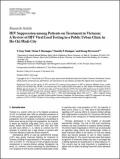Publications - Released in 2010
Vietnam is a country with one of the highest prevalences of HIV in Southeast Asia. With an estimated prevalence of 293,000 people in 2007 (approximately 0.5% of the general population), the HIV epidemic is primarily concentrated in urban areas among key high-risk populations, the majority of which are injection drug users (IDU), and to a lesser extent, female sex workers (FSWs) and men who have sex with men (MSM). Efforts to confront the HIV epidemic in Vietnam face a high burden of patients with comorbid substance abuse and limited resources. International efforts to scale up antiretroviral therapy (ART) have greatly improved funding for treatment in Vietnam, allowing for approximately 14,969 people to receive ART as of 2007.
The goals of this study were to document ART efforts in a resource-limited setting with high prevalence of IDUs, to identify high-risk groups for failure who may benefit from more frequent monitoring or other interventions and to assess the potential for delayed diagnosis of treatment failure when using targeted testing based on clinical and immunologic criteria.






